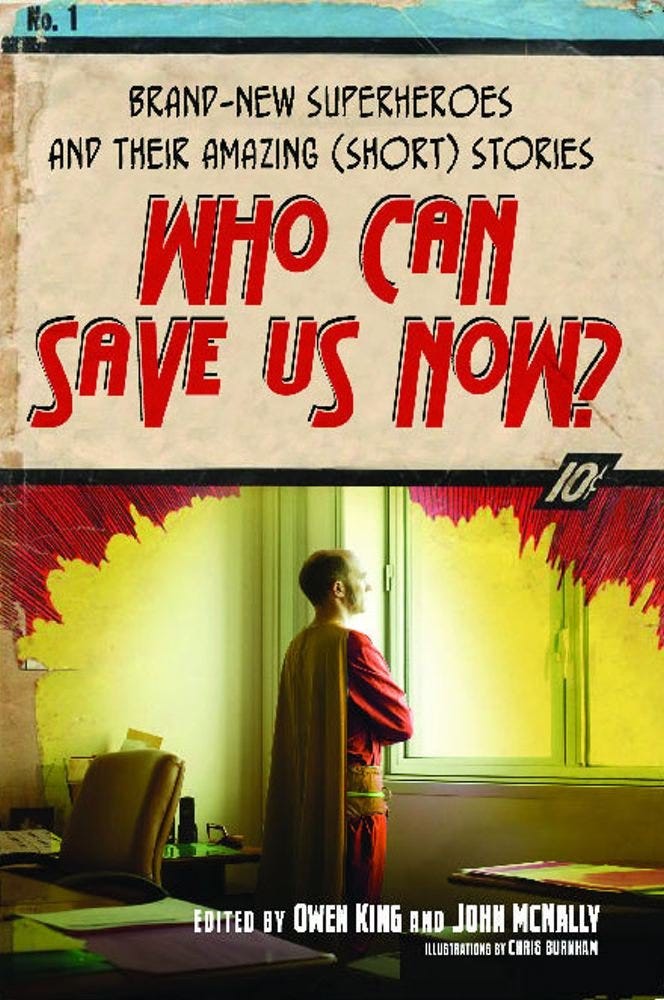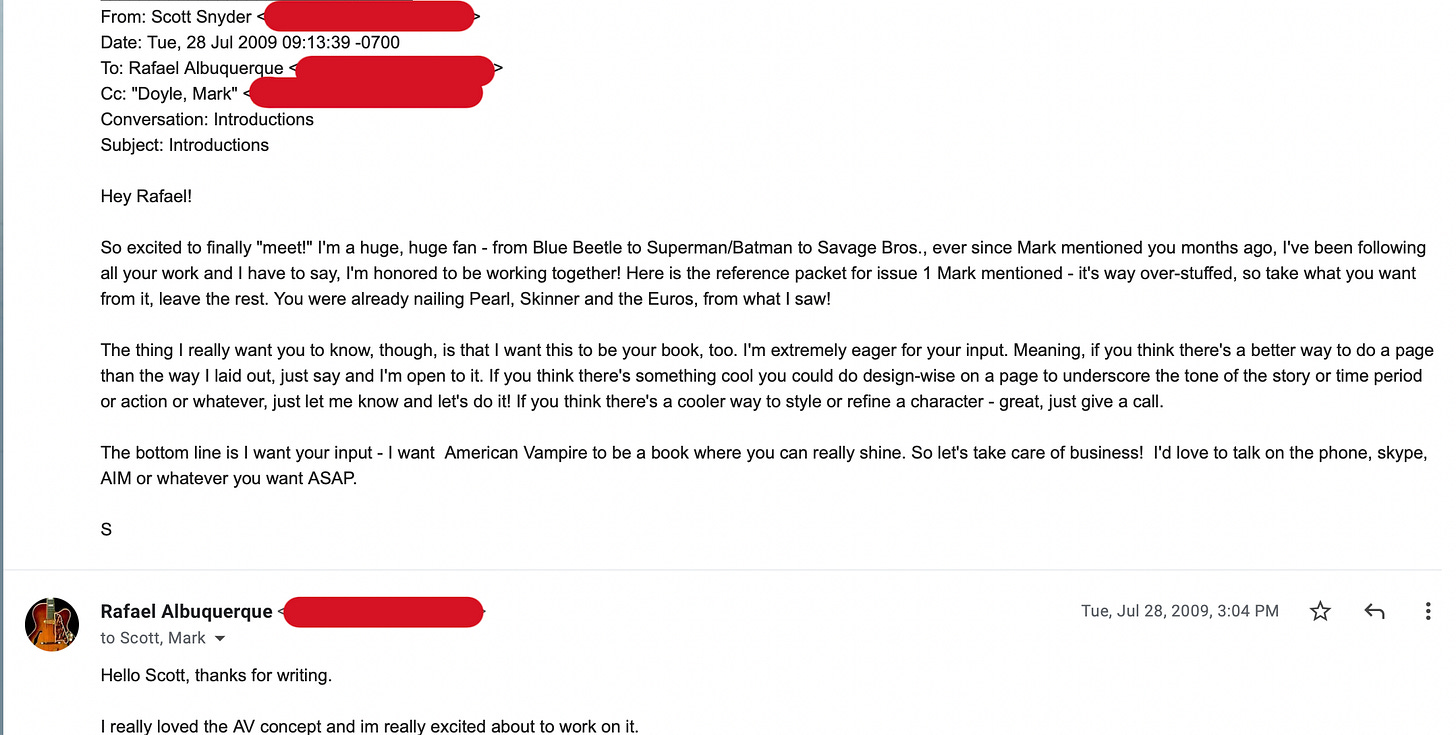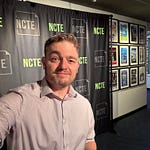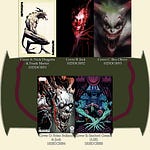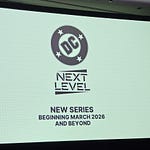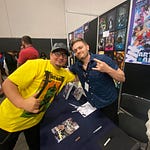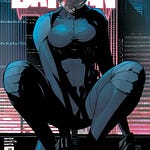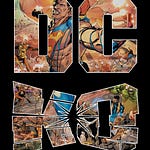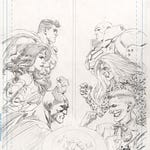Hey, it’s Scott, and today I was gonna talk a little bit about American Vampire. Our final issue comes out, American Vampire 1976 #10, and I think it constitutes probably about our 50th or 60th issue. I’ve written about as much of this series as anything, even Batman, and I have such big feelings about it. American Vampire is the series that launched my whole comics career. It's the one that really made my dreams come true, not to sound too corny. But everything began with this one. So, for me, when I first pitched it, the way that it all happened was… I was working in books. I had always wanted to be a comic book writer/artist, like Frank Miller or Mike Mignola. And then in college, I had even kept up with illustration, but I realized in my late teens/early 20s that I wasn't good enough, and so I fell more into fiction. I went to grad school for fiction, and I traveled around the country and worked some odd jobs. I wrote a collection of short stories, and I was lucky enough to find an agent and sell them.
So, I was working in books in 2006/2007, and I had done this collection of short stories that had done pretty well for me. I was working on a novel, essentially, for the same publisher, for Random House & Dial. What happened was, I had signed this two-book deal with Random House where they had taken the stories, but really what they were after, even more, I think, was that the second book, the novel, and they had taken it on spec. And it was about aviation in the early 1900s, and I really loved it, but it was a quieter book, and as the economy crashed and contracted in 2007/2008, the book market began to dry up and it became clear that this was a book that, to earn back its advance, would need to be a big bestseller. And so even though my publisher was really nice, I felt this huge pressure because we had just moved and bought a house and we had had a baby (who is now 14), but back then was just barely anything. And I had totally misjudged everything where I realized that the only way I was gonna get the money that I thought I was promised was to write something that was going to be hugely successful.
And so, I started changing the story—adding a love interest, giving a villain, all of this stuff. And it was the most miserable period of my life. I had the job that I thought I wanted, I was a writer, but I would go downstairs and work on this book and just hate it. I kept saying to myself, “just get this one done. Do this one for them and then you'll do one for you. You can do a version of it or another story that's more yourself. This is just so that you can pay the bills.” And I was drinking too much, I mean, the whole thing—my marriage was straining, it was really awful. And amidst this, I got an offer from a friend of mine, Owen King, to be in an anthology of short stories about superheroes. And I never stopped reading comics. My local comic store out here, Fourth World, was like my hideout, the place that I went to escape all the pressure. I was really close with everybody there. And Owen was like, “this is an anthology for writers who love comic books but are in the literary world and want to make up new superheroes or supervillains.” So, a lot of it was funny and humorous. There was a story about a support group for superheroes with awful powers, like one of them never had to go to the bathroom and he was always like “well where does it all go?!” But I took it really seriously and I did this tragic story about a kid that was to close the Bikini Atoll tests on his ship in the 1950s and wound up irradiated and came back with these powers.
And I caught the attention of Mark Doyle and Jeanine Schaefer, who at that time were young editors at DC and Marvel respectively, and they came to the reading for the book. And at the end, they asked us all if any of us were comic fans, and I had comics in my bag. And so, I started talking to both of them, unaware that they were a couple, by the way (they didn't tell me for a long time after). And one of the funny things was that I started working for Jeanine at Marvel and Mark at DC, and Janine would be like “how's it going over at DC?” And I would say, “oh it’s good, except I wish my editor would call me back,” and then suddenly Mark would call me back. Or he'd be like “how's it going over at Marvel?” And I’d be like, “it's great, but I’m still waiting on notes from my editor,” and then I get those notes like a couple days later. So, I'm not Batman. It took me way too long to figure out that they were together. Now they’re married and have two beautiful children, we’re extremely close. They’re basically the best Marvel/DC crossover that ever happened.
But the point is, they got me pitching for both Marvel and DC. And I met with Mark, I vividly remember this, at a pizza place, a restaurant across from the DC offices. And I was so nervous, because I was like, this is my chance to pitch. And I remember my wife just being like, “well why are you writing a story for this anthology when, if you just finish this book, you’ll be out from under the boot and not so stressed?” And I was like “because it’s the only thing I'm happy with right now, writing-wise.” It just was such a joy to write the story and get out of the pressure. And then when I was pitching, she was like “comic books… is that really gonna pay anything?” And I was like, “look, just let me go see what it is. Please, let me figure it out.” And so, when I went to this meeting, Mark and I connected right away. What happened was we started talking ideas, and I pitched him a couple ideas. But my favorite was American Vampire, which I think was called The Hunted, or something like that back then, and he suggested calling it American Vampire not long after.
And I revised—he asked me to go back and write an outline and a pitch, and I did. He had to coach me through it. He sent me a couple examples, secretly, of other series to help me. He coached me through that, and we became close friends during this time because we saw that if we can get this series through, it would be something we can work on together and it might make both of our careers. And I vividly remember, again, my wife being like “but if you do this, you’re not gonna be able to write the book, right?” And I said, “no no no, I can do both, I think, but I don't know if this'll pay anything, I don’t know if it’ll go through…” And she was amazing. She just said, “listen, let's take out another loan. Go over and work in comics, dissolve this book contract. Even if we are gonna take a risk, you seem happy doing this. You’re miserable doing that.” I’ll always be grateful to her for that, among a myriad of things.
So, I developed this pitch with Mark. We gave it to Will Dennis, who’s my editor here at Best Jackett, one of my closest friends. He gave it to Karen Berger, who was amazingly supportive. And at first, it got rejected. I remember exactly where I was when it got rejected. I was sitting outside my kid’s daycare and Mark called me, heartbroken, and he said, “it's just it's just that westerns right now aren’t doing great, and vampires are all over the place.” And I was like, “but you and I know it's not a Western. It's about Pearl and Skinner. But more than that, it's a look at American history through the lens of these two different vantage points. One character who's the best of us and one character who’s the worst of us. One character who wants to be part of something bigger than herself and espouses all these great American principles and ideals, even if she doesn't realize it, and one character who's all of our worst impulses about being big and selfish and greedy and having your name in lights and everything being about you and creating a reality around yourself.” So, he said, “I know, but they just said no.” So, I was like, “can you give me a weekend to just rewrite it?” And he said, “look, they don't really look at pitches twice,” and I said, “please, just give me a chance.”
So, he said he would do his best, and I spent the whole weekend rewriting the pitch, handed it in, and Will and Karen gave it another look. And a couple weeks later, I remember exactly where I was, yet again—I was teaching down at NYU and I was walking through the East Village, and I got the call from Mark, who was like, “guess what, man?” I was like “no, no you have to be kidding me. Don't fuck with me on this…” And he was like, “it’s true, it went through!” And I was so ecstatic. I just remember literally jumping up and down on the sidewalk on 14th St. and Broadway. It changed my life. I knew whatever happened, I would have a book on the comic stands.
Not to get too off-topic, but then a crazy thing happened where they asked me if I knew anyone in the book world that could write something promotional for it, now that it was through, and the deal was gonna get announced. And I said, “well, I know Stephen King from the book world.” And I wrote him and asked if it was possible for him to write a blurb, and he said to send him the series. And I did, I sent him the pitch and then he wrote back and said, “I think maybe I'll write an issue of this sometime, you can tell them that!” And I’m like, “I can't tell them that, because if I do, they’ll want you to write the first issue.” And he said, “no no no, tell them!” So, I called them, and I left a message on Friday afternoon after the offices were closed, saying, “listen, Stephen King might be up for writing an issue.” And that Monday, I remember it was like 8:30 in the morning on a Monday, I got the call from them being like, “did you say Stephen King is willing to write his first comic for American Vampire?” And unfortunately, I had already sold it at that point, so I didn’t get any more money for it, but Stephen King (Steve, as he asks you to call him) was the nicest guy. He was supposed to write one issue and he lost himself in the story in the best way, the way all great writers can sometimes (and should), and he wound up writing five issues. He was an incredible guide and mentor for us. He created characters along the way, and he would only work for the minimum page rate with no equity. And it was amazing, he was just the best participant. He would mess with you, too, like he would write an ending where Skinner turned into a bat, and I would be like oh my God, I have to tell Stephen King our vampires don't work that way... And I would call him, and he’d be like, “oh I’m just fucking with you,” and then he’d write the real ending.
But then the last thing I'll say is, soon into the process, Mark introduced me to the work of Rafael Albuquerque, and I loved it right off the bat. I saw his Blue Beetle and some other things and Mark said, “let’s ask him to do samples.” So, he did some samples, and we really didn't even look anyone else. It was the first one and I was like “this is him! He gets who Skinner is, and who Pearl is, and this adaptable style, it’s perfect.” And we reached out, and we hit it off right away. He was a fan of all the same things I was. We both had Butch Cassidy and the Sundance Kid posters and all the big American mythology. And when he signed on, he signed on as a work for hire. We soon made him co-creator. And this team: him, Dave McCaig, who came in to color it and has been with us from the very beginning, tells a story through color. Steve Wands, who’s been lettering it from the early days, and Mark Doyle stayed with it until he left DC. Maggie Howell, who picked it up and has been an absolutely incredible steward and leader of the team. We had a short stint with the great editor named Ellie Pyle. But this team has generally stayed intact from the beginning to now and we’ve been family on the book, and that to me is a huge accomplishment in it of itself.
I can't thank you guys enough for letting us do this series this long. We’re ending it on our own terms, and I do think, like all great monsters, it’ll come back someday in another form. But it felt like this was the right time to do this ending that we had planned from the very beginning. And if I could, I'd include the outline document (but it’s property of DC) that has the outline for this very last arc, 1976, in the initial pitch document. So, there was a lot of surprising discoveries and wonderful detours along the way, but this ending was always the ending, and it's an amazing feeling to get here today and have this arc wind up being even more resonant and relevant to all of us in these times than we expected. So, thank you so much. I can't tell you how much it means to have gotten to do the series this way with these people and with you.
Onto the next, right? As Skinner would say, “off we go.”
S




